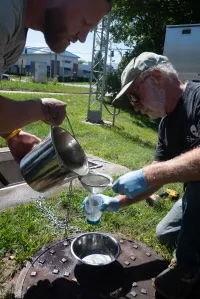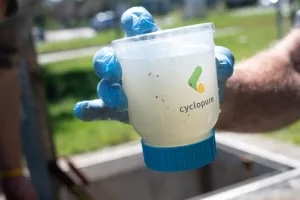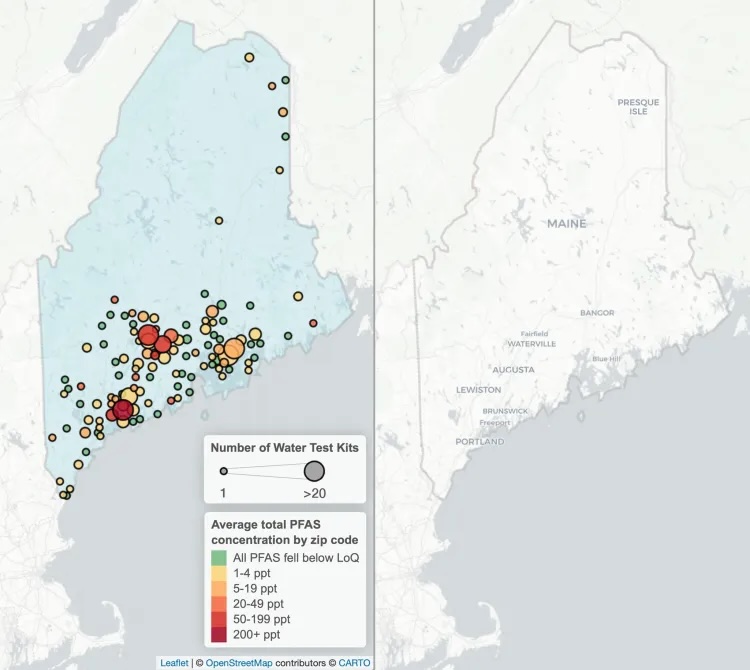Behind the scenes of company that makes PFAS testing kits used in Brunswick
An in-depth look at Cyclopure, the Illinois-based maker of accessible PFAS testing kits.
PFAS are a growing concern in Maine, particularly in Brunswick after 1,450 gallons of firefighting-foam concentrate mixed with 50,000 gallons of water spilled at the airport last August. That spill caused widespread concern about water safety and efforts to mitigate and monitor the fallout.

Ed Friedman of Friends of Merrymeeting Bay collects a water sample with the Cyclopure water test kit in the fall of 2024. The sampling was done to monitor PFAS levels coming from Brunswick Executive Airport, a former military base. Kristian Moravec / The Times Record file photo
As residents who live near the site of the spill worry about impact to their drinking wells, they face hurdles to water-quality monitoring: Certified lab tests can cost hundreds of dollars for just one sample, and state-run testing in the wake of the spill is only provided a handful of times a year to pre-selected residents. As a result, many residents have turned to another source for vital water quality monitoring: Cyclopure.
Cyclopure, an Illinois-based company, sells water test kits at $79 apiece — a more cost-effective but lesser-known alternative that scientists and local organizations have pointed to for more frequent monitoring.
“If you pick up the phone and call 50 people and ask them about Cyclopure and Dexsorb (the filter that comes in a testing kit), probably a lot haven’t heard of us,” said Cyclopure CEO Frank Cassou. “But there is a core of people that are really, really active in that area and are very familiar with the company.”
Some groups that use the tool in the Midcoast include nonprofit Friends of Merrymeeting Bay, which has tested for PFAS in the Midcoast for a while, and the Brunswick Renters Organization, which recently embarked on an endeavor to collect PFAS data around town using Cyclopure kits. Even the Town of Brunswick’s website now links to Cyclopure on its firefighting foam spill information page, and Brunswick Sewer District uses citizen testing data from the kits to find possible sources of PFAS in the sewage system.
Spill aside, affordable PFAS testing kits are increasingly relevant as the public awareness of the negative health affects from PFAS grows. PFAS (per- and polyfluoroalkyl substances, also known “forever chemicals”) can increase cancer risk and cause other health problems, according to the Environmental Protection Agency.
Some Maine Department of Environmental Protection baseline-testing data from September in Brunswick showed that some wells already exceed Environmental Protection Agency guidelines for safe drinking water, though the agency doubts that these early figures are a result of the spill at Hangar 4 based on how slow ground water moves. Friends of Merrymeeting Bay also took samples of a sewer pit near another airport hangar of concern — Hangar 6 — using Cyclopure. The results will likely be available next month.
In November, Cyclopure invited The Times Record to its lab to learn about the test kits. While well and hangar test results are pending, here are some key takeaways about the testing kit and its impact in Maine.
The eco-friendly, cost-effective filter disc
At the heart of this small testing kit is a filter known as Dexsorb, which Cyclopure has used in PFAS-heavy remediation sites like Department of Defense facilities, closed landfills, industrial waste waters and more.
“Everything we do is based on Dexsorb — that is the adsorbent that we developed to treat PFAS,” Cassou said. “And we utilized renewable source compounds called beta cyclodextrins which are derived from plant starch. That’s why they’re renewable — you can get it from potatoes and corn.”

A Breakdown of the Cyclopure Water Test Kit Courtesy of Cyclopure
The plant-based filter — a thin, circular disc contained in the water testing kit — captures PFAS. Cassou noted that the filter is designed to be more selective compared to other methods like activated carbon or ion-resin exchange — two of the main materials used to capture PFAS in water. This means that the filter works efficiently across different water sources (drinking, surface, ground and non-drinking water) and is more cost effective since the company can use less material in each cup.
Cassou also pointed to the filter’s potential for reusability. Dexsorb filters, once spent, can go through a “regeneration” process to increase its life span.
The process entails conducting a “backwash” — or a flow of solution of ethanol and water — to pull PFAS from the filter. After this, the PFAS-containing solution goes through a distillation process to recycle the ethanol. The waste is then concentrated into a smaller form before being sent off to incineration, a tried-and-true method to destroy PFAS.
Not EPA-certified (due to a technicality)
While official entities like the DEP utilize EPA-certified labs for PFAS testing, some Maine scientists and environmentalists have pointed to Cyclopure as a good way to get a sense of what’s in drinking water.
Entities like the Midcoast Regional Redevelopment Authority, the agency on the hook for the spill that is charged with redeveloping the land on and around the airport after the Navy base closed, also released a statement noting that it would only share certified lab results for PFAS testing, adding that non-certified sources may not meet established standards.
Cyclopure was not named in this statement, but Cassou said the company’s data collection process is the only reason it does not have certification. While he acknowledges that the EPA methods are designed to create a common basis of comparison between labs and test results, Cyclopure is not EPA certified because it does not require water samples from customers. Cyclopure customers send the filter, not the water container, to the lab for testing.
“We are really taking a polaroid of the PFAS concentration at the moment of sampling,” Cassou said. “Which doesn’t happen with the commercial lab, because you don’t take that polaroid until it gets back to the lab.”

Friends of Merrymeeting Bay Chairperson Ed Friedman holds a Cyclopure test kit full of waster water at Cook’s Corner on Aug. 29. Kristian Moravec / The Times Record file photo
How results compare to other testing sources
Friends of Merrymeeting Bay, which Cassou said frequently works with Cyclopure, conducted PFAS testing late July last year using both the water test kits and standard PFAS sampling at a Massachusetts-based company called Alpha Analytical, which is an EPA-certified lab.
The results in this split sample showed that the Cyclopure kits detected PFAS more conservatively compared to labs.
For instance, testing at a sewer pump referred to as the Brunswick Naval Air Station Theater Pump showed 1070.57 parts per trillion of PFAS in the certified results. The Cyclopure kit showed 728 parts per trillion. Regardless, both results showed alarmingly high amounts of harmful PFAS compounds such as PFOA (perfluorooctanoic acid) and PFOS (perfluorooctanesulfonic acid).
Testing at a sewer pump at Hangar 6 also showed alarming levels of harmful PFAS in both samples. Here, the Cyclopure kit detected 23,927.9 parts per trillion of PFAS while Alpha Analytical detected 29,687.2. While these samples were taken from sewer water and not drinking water, the waste, which is not treated for PFAS, ultimately flows into the Androscoggin River.
In a split raw water sample that Cyclopure conducted separately, the kit was compared to a stringent EPA’s PFAS testing method known as the 1633. Cyclopure said that the 1633 method detected 1,184.6 parts per trillion of PFAS while its kit found 1,194.4 parts per trillion.
Cassou said that the best water test kit results come from frequency.
“If you test over time, you’re going to have really good reliability from inconsistency with our kits,” he said.

A Cyclopure data map shows hotspots of sales and PFAS test results across Maine. The size of the circle correlates with the number of water test kits sold to the area, while color indicates the PFAS levels detected. Courtesy of Cyclopure
Kit sales correlate with PFAS concerns
At the time of the interview, Cyclopure sales in Maine mostly comprised of water testing kits, though a few of the household products that the company produces were also sold.
In a kit sale and test results data map, Cyclopure shows the Brunswick area as a sales “hotspot” — or exceeded 20 test kits sold — and that PFAS levels detected in water test kits exceed, on average, 200 parts per trillion.
The EPA announced in 2024 that it was designating two types of PFAS — PFOA and PFOS — as hazardous substances and to regulate them at 4 parts per trillion, though it noted that safest amount of exposure is zero parts per trillion.
After this, as awareness grew, sales for testing kits across the country increased, Cassou said, noting its common for sales to spike when the public has a heightened awareness of a possible PFAS contamination.
“There’s been several spills [around the country],” he said. “Whenever those kind of things happen, we see a big spike in water-testing interest.”
He said that this map also serves as a good indication of where PFAS in water supplies might be an issue. Many regions with former military bases and industrial spaces tend to be areas that generate sales, for instance.
Since the kit was rolled out in 2020, the company has sold 6,000. But in 2024, Cassou estimated that sales would be double of its sale history — close to over 12,000 kits.
To learn more about Cyclopure or the testing kit, visit cyclopure.com.
